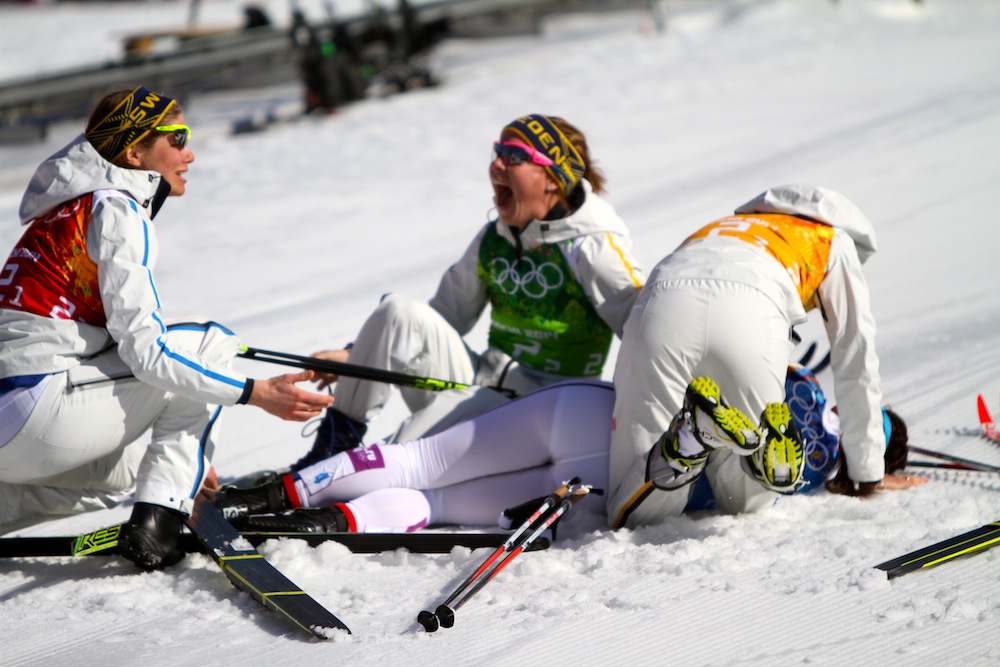
FasterSkier’s coverage is made possible through the generous support of Rudy Project.
SOCHI, Russia – “When her eyes get dark, I know she will go fast,” Ida Ingemarsdotter said in a press conference today.
She was talking about Swedish teammate Charlotte Kalla, with whom she won team sprint at 2011 cross-country World Championships and the silver two years later.
And in today’s Olympic 4 x 5 k relay, Ingemarsdotter – a sprinter who nevertheless turned in a flawless scramble leg for Sweden to tag off in third, just 4.3 seconds behind the leader – saw that expression on Kalla’s face once again.
“When I saw Charlotte going out on her finish…” Ingemarsdotter marveled.
She wasn’t the only one. Finnish coach Magnar Dalen said that when he saw Kalla start, he began to worry about whether his team, anchored by Krista Lahteenmaki could hold onto gold.
At face value, that seemed ridiculous. At the final handoff, Sweden was down 25 seconds to Finland and Germany, who had put themselves in the lead with strong third legs.
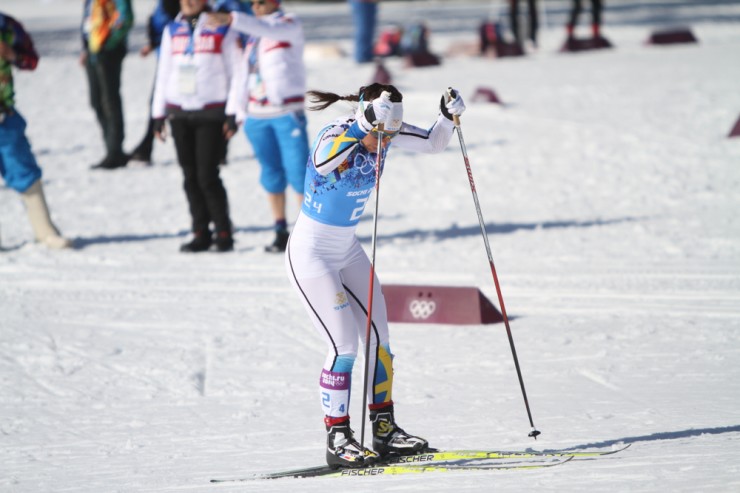
And on a normal day, Kalla should have been arguably more concerned about what was going on behind her, not in front. Marit Bjørgen of Norway – the winningest skier in World Cup history and the gold medalist over Kalla in the 15 k skiathlon – was just eight seconds behind Kalla at the tag.
The Swede’s challenge was to avoid being caught by Norway. If she could hang on to bronze, it would be Sweden’s first medal in a women’s relay since 1968.
But neither history nor Bjørgen weighed too heavily on Kalla’s mind.
“I tried to keep my focus on my own race and my own skiing,” she said. “I tried to open quite controlled and not going too fast before the next kilometer.”
As it turned out, Bjørgen was slowed down by the same challenge that the rest of her Norwegian team faced: slow skis. The team came in as the defending Olympic champions and hadn’t lost a World Cup relay since before the last Games, but not a single skier was able to turn in a top-three time on their leg of the relay.
“Innrømmer smørretabbe” was the headline on Norway’s NRK broadcaster, loosely translated as “admitting a wax mistake.”
It’s not common to see Bjørgen struggling around a ski course, but just like her teammates, she turned in an unusually poor performance. At various points she looked belabored or even checked out, and brought Norway home in fifth – an unmitigated disaster.
“An ass of a day and one of my worst as a coach,” Norway’s Egil Kristiansen told NRK.
In any case, Bjørgen wasn’t going to be coming back.
Instead, Kalla was going forward.
“I was pretty inspired by the other women in my team,” Kalla said. “They did their best of the season so far, and I knew that we had really good skis. So I was really motivated to do my very best when we went out…. I just tried to catch as much seconds as possible.”
Slowly, she climbed closer to the front.
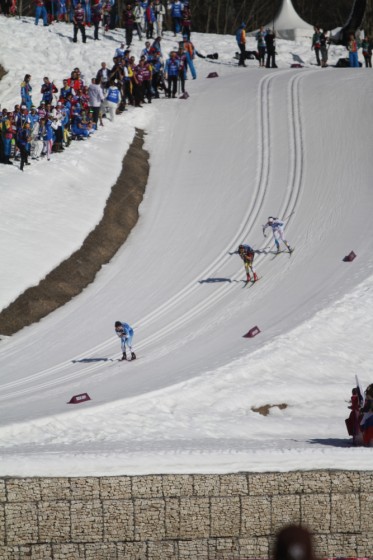
“We felt that Charlotte comes nearer and nearer to us,” German anchor Denise Herrmann said, remembering the feeling of the last four kilometers.
Johan Granrath, Sweden’s assistant coach for its women’s team, said that Kalla had made up five or ten seconds on the leaders very quickly. Then, it got harder.
“She was really tired,” Granrath said. “I had to coach her.”
Granrath couldn’t tell exactly how tired – he said that her eyes were “going like this,” waving his arms in circles as a demonstration.
“But Herrmann and Lahteenmaki were tired as well,” Granrath said. “I knew Herrmann and Lahteenmaki are really good in the end… I was worried about whether [Kalla] could beat them.”
By 500 meters from the finish line, the Swede had, incredibly, made contact with the two leaders. She followed them down the hill into the stadium, getting pinched on the downhill corner but recovering quickly. By the last turn, she overtook the two and started her finishing sprint.
“The last 300 meters I thought I could make a good sprint, but the other two girls were really fast too,” said Herrmann.
“I was full of lactic acid 200 meters before the finish line – I thought I would fall down,” Lahteenmaki admitted.
Neither was able to hang on as Kalla jetted towards the finish line and crossed it with a half-second lead.
“When I saw the backs of Finland and Germany, I just wanted to go for gold,” Kalla said. “I was satisfied with a bronze, but I knew that if I fought really hard, it would be possible to cross the finish line first of all.”
In doing so, she made even bigger history for Sweden: it was the first time the women had won an Olympic relay since 1960. Kalla also became the first athlete of this Olympics to earn three medals, after her silver in both the 30 k skiathlon and the 10 k classic.
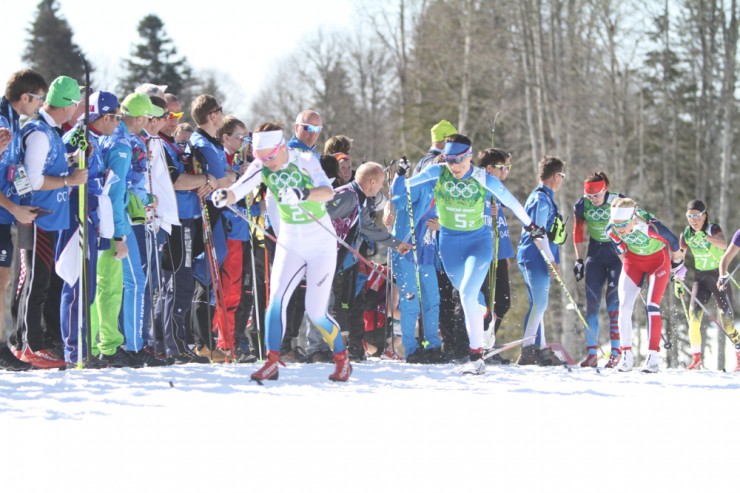
It was Sweden’s eighth medal in cross country skiing so far at this Games, which is one more than Norway and leads all other countries. It’s also already a Swedish record, even with five more races still to come.
While Kalla and Ingemarsdotter have found plenty of success together, it was a remarkable accomplishment for the team. At 25 years old, Emma Wikén skied a strong classic leg as the team’s second skier to tag off in first place.
“The skiing Emma did today was probably the best skiing I’ve ever seen from her,” said Johan Granath, the assistant coach for the Swedish women’s team. “This was the best race she did this season.”
Haag, skiing in the third leg, was an even bigger question mark. She has had a tough season, not receiving full World Cup starts and never finishing in the top 10. It is a far cry from the 2010 Olympic season, where she won silver in the 15 k skiathlon.
Haag was not chosen for the relay until two days ago, when she learned she had been picked ahead of Sara Lindborg and Britta Johansson Norgren, both of whom have better results at this Games so far.
“I was so nervous,” Haag said of waking up this morning and knowing the task that faced her, namely not to let the team down.
A Swedish journalist speculated that had the team not medaled, there would have been calls for Haag’s head on a platter.
While she lost those 25 seconds to Finland and Germany, Haag’s effort was good enough.
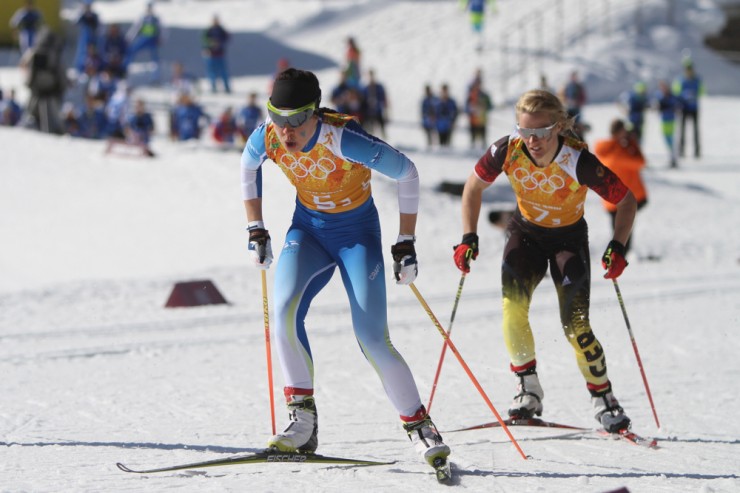
“I’m just really happy to be part of this team,” she said. “I fought as hard as I could. Winning a gold medal after this season is just incredible – and these girls! We won a gold for the team today, not just us four. For all the coaches and all the other athletes. It’s just amazing.”
Granath agreed.
“We don’t maybe have the best skiers on every leg, individually, but this is a team competition,” he said.
Finland is used to winning relay medals – this was their ninth relay medal since women began skiing in team competitions at the Olympics in 1956 – but for the Germans, bronze was unexpected.
It’s not because they haven’t had strong relays in the past. This is the fourth consecutive Olympic relay medal for Germany, the longest active streak of any country’s men’s or women’s team.
Rather, their distance skiing is not particularly deep or remarkable in the last few years.
Indeed, the strongest performance of the day came from 35-year-old Claudia Nystad, who won gold in the team sprint in Vancouver before retiring. This is her first season out of retirement, and she has claimed only a single top-10 finish on the World Cup.
Today, though, Nystad skied a monster third leg for Germany to hang tough with Finland’s Kerttu Niskanen. Nystad tagged off five seconds down from Niskanen, and had left Haag in the dust.
“This is a great honor to participate in the Olympic games and to be successful,” Nystad said through a translator. “This is wonderful. It’s a great reward because it means I came back to the sport… it’s not always easy to win. I also won a medal [four] years ago, but now with regards to a 5 k race, I had to pull together all my energy. This is great happiness and joy for Germany. This medal means a lot for the team and my joy is endless.”
Herrmann had quickly made up the gap to Lahteenmaki, and although she had dreamed of gold, was happy to hang on to bronze.
“We are really happy, because we didn’t think that the German team would be able to be on the podium today,” Herrmann said.
France finished fourth, their best result in the history of the Olympic Games.
Host nation Russia missed out on a medal in cross country yet again, finishing sixth.
-Nat Herz contributed reporting.
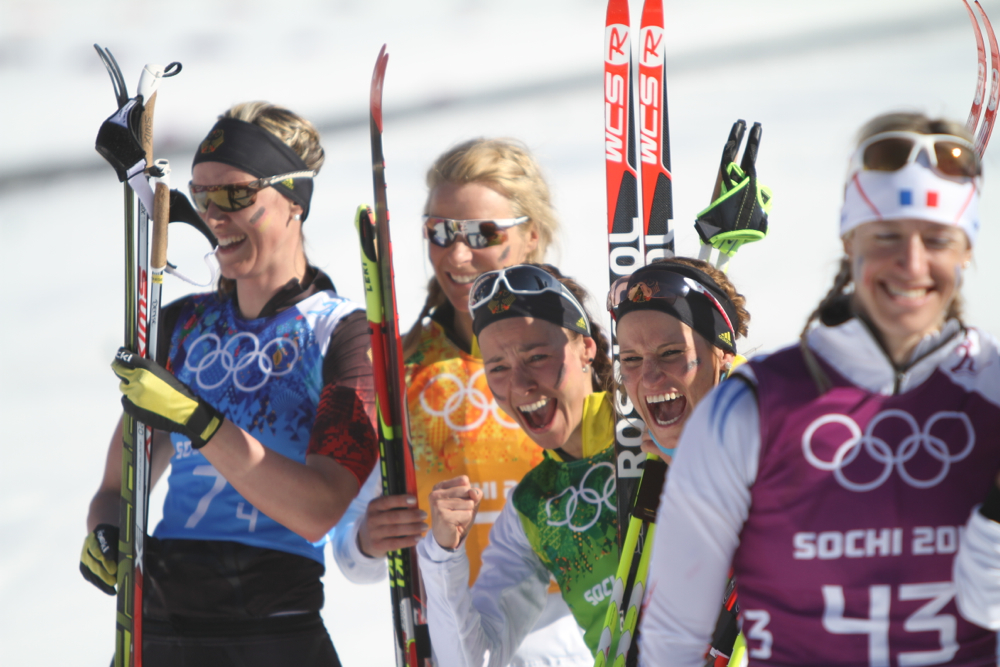
Chelsea Little
Chelsea Little is FasterSkier's Editor-At-Large. A former racer at Ford Sayre, Dartmouth College and the Craftsbury Green Racing Project, she is a PhD candidate in aquatic ecology in the @Altermatt_lab at Eawag, the Swiss Federal Institute of Aquatic Science and Technology in Zurich, Switzerland. You can follow her on twitter @ChelskiLittle.

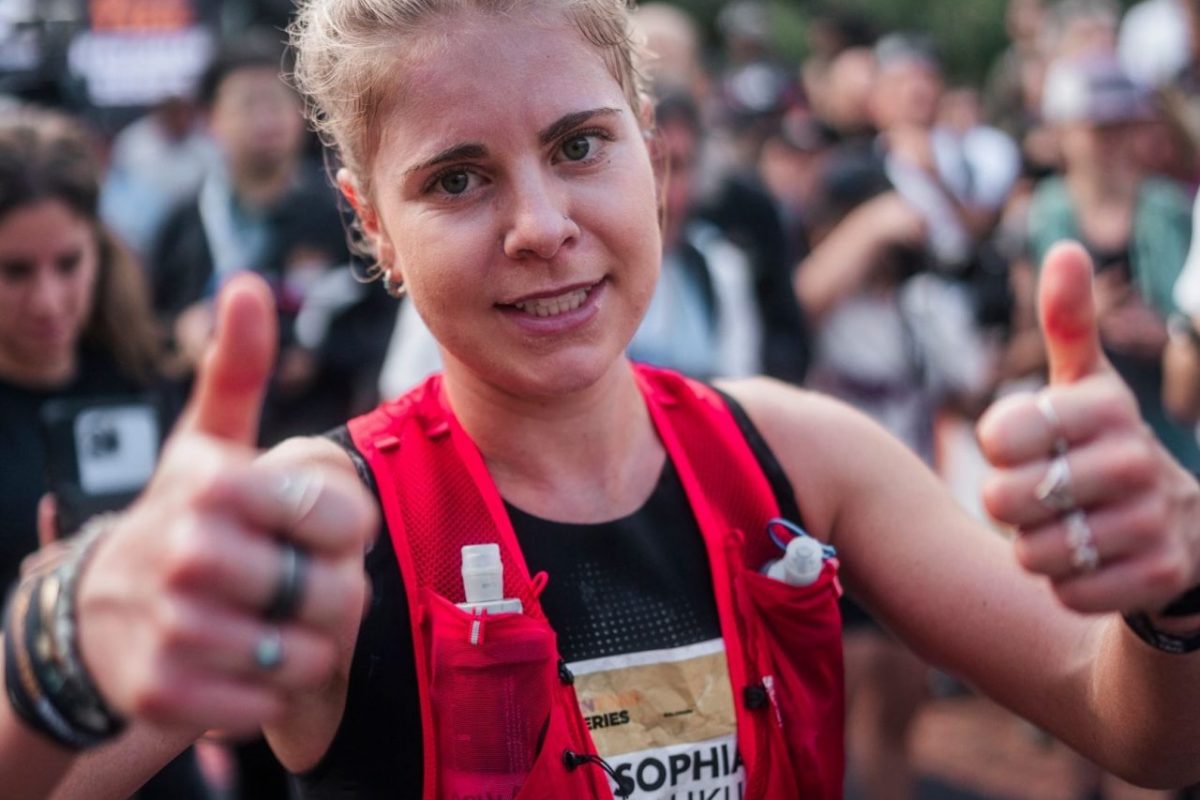


One comment
John Forrest Tomlinson
February 15, 2014 at 9:11 pm
Love the way Kalla races. Her tactics in the skiathlon were so good, and in this one she went so deep. Great medallist.